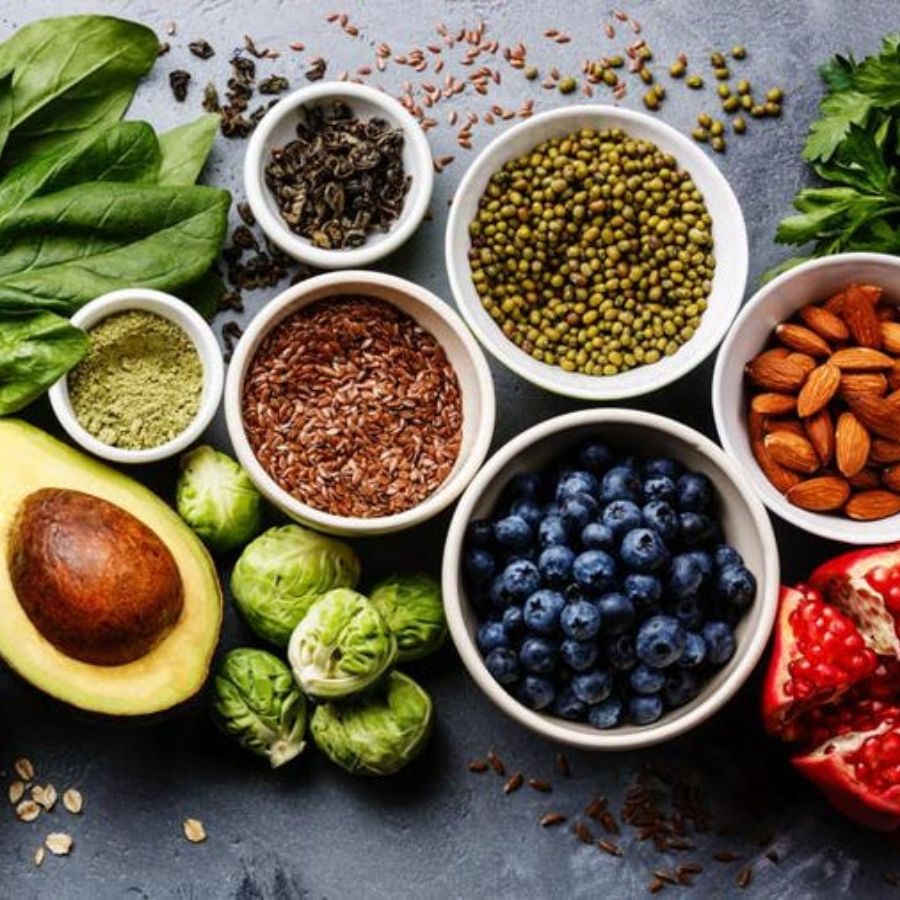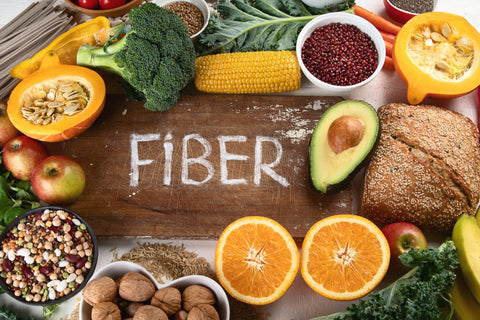
This Food Is Linked To Weight Maintenance & More
Gaining control of your weight doesn't have to be so challenging. Increasing your intake of a particular nutrient, namely fiber, may be all that's needed.
Fiber is the king when it comes to losing weight. Even if you don't change your diet or cut calories, eating more fiber may help you lose weight. How? The first point, fiber is an expert appetite suppressant. It makes you feel full quickly and satisfied for a more extended period by reducing the speed at which food is absorbed into the bloodstream during digestion.
Fiber not only helps you lose weight by decreasing your hunger but also has effects that are felt first and foremost in your gut, facilitating a more efficient metabolic rate overall. Keep reading!
What Is Fiber & Its Role In Weight Maintenance?

"Fiber" refers to a specific type of carbohydrate that the body cannot completely digest and absorb. Soluble fiber & insoluble fiber are the two types of fiber.
To slow digestion, soluble fiber dissolves in water to form a gel-like substance, whereas insoluble fiber adds bulk to the stool and speeds up food movement through the digestive system.
Fiber can play a crucial role in weight maintenance because it helps promote feelings of fullness and satiety. Eating fiber absorbs water and swells in your stomach, which can help you feel complete for extended periods. This can lead to reduced calorie intake and may help prevent overeating, leading to weight maintenance or even weight loss.
Fiber also has a low energy density, meaning it contains fewer calories for the same volume of food compared to other nutrients like fats and carbohydrates. This can help you feel full while consuming fewer calories.
Also Read: Foods To Be Avoided For Weight Loss
Fiber Important For Weight Maintenance

Promoting Gi Well-Being And Weight Loss With Fiber
A healthy digestive system has been shown to affect body weight positively. Over 100 trillion bacteria call your significant intestine habitat. The term "gut microbiome" describes this community of bacteria. We don't know everything about these helpful bacteria, but they can alter body weight and other health factors.
Like you, the bacteria in your digestive tract require a balanced diet of nutrients to thrive. This is because gut bacteria ferment soluble fiber into energy after it passes through the digestive system.
Butyrate is a fatty acid that is produced in this reaction. Short-chain fatty acid (SCFA) butyrate promotes insulin production regulation and enhances glucose uptake into muscle and adipose tissue by increasing the release of specific gastrointestinal hormones. This helps regulate glucose and prevents weight gain. In addition to aiding in regulating fat metabolism, the increased rate of fat oxidation and the diminished rate of fat storage are also benefits of short-chain fatty acids. They also have anti-inflammatory and cholesterol-lowering effects.
Also Read: Do Ultra-Processed Foods Cause Health Risks?
Deficit In Abdominal Fat With Fiber
Increasing the variety of bacteria in your digestive tract is one benefit of eating a wide variety of fermentable fiber. Scientific research indicates that the prevalence of dangerous visceral belly fat is lower in people with a broader diversity of gut flora. For example, one study found that lowering the risk of accumulating visceral belly fat was associated with increasing daily fiber intake of just 10 grams.
Reduce Your Hunger Pangs With Some Fibre
Consuming refined carbs and high-sugar foods can cause your blood sugar to fluctuate after meals, leaving you feeling hungry and more likely to overeat. High-fiber foods prevent this drop in blood sugar and keep you feeling full longer, so you eat fewer sweets.
Also Read: The Necessity of Consuming Fast Digesting Foods
How Does Fiber Work In The Body?

When you eat fiber, it moves through your digestive system largely intact. The soluble fiber, in particular, is fermented by bacteria in the large intestine, producing short-chain fatty acids (SCFAs) like butyrate, propionate, and acetate.
SCFAs have several health benefits, including:
- Providing energy to colon cells and reducing the risk of colon cancer
- Regulating blood sugar levels by increasing insulin sensitivity and improving glucose uptake by muscles
- Reducing inflammation throughout the body may help protect against chronic diseases like heart disease, diabetes, and cancer.
Insoluble fiber also has essential health benefits, adding bulk to the stool and helping prevent constipation. This can help promote regular bowel movements and reduce the risk of digestive issues.
Examples of fiber-rich foods:
- Whole grains: Oats, barley, brown rice, quinoa, whole-grain bread, and cereals are good sources of fiber.
- Fruits: Apples, berries, pears, oranges, and bananas are all high in fiber.
- Vegetables: Broccoli, Brussels sprouts, carrots, leafy greens, and sweet potatoes are just a few examples of fiber-rich vegetables.
- Legumes: Chickpeas, black beans, and kidney beans are all high in fiber.
Also Read: 14 Exciting Tips to Lose Weight Without Exercise
The Takeaway
YourHappy Weight (Gummies)
Key Benefits
- Burns fat for energy & reduces stubborn fat/cellulite
- Boosts metabolism, healthy energy levels & overall mood
- Reduces the absorption of carbohydrates by the body
- Diminishes the body’s ability to store surplus fat & cellulite
- Eliminates bloating by flushing out excess stored water
Fiber-rich foods are linked to weight maintenance and several other health benefits due to their ability to promote feelings of fullness, improve digestive health, and reduce the risk of chronic diseases. You can increase your intake of this essential nutrient simply by eating a diet that includes a broader selection of foods high in fiber.
For a weight-loss regime, add on YourHappy Weight (Gummies), a weight-loss journey partner, as a complete weight management solution.
FAQ
Why does fiber play an essential role in keeping the body healthy?
The ability of the body to use carbohydrates is regulated by fiber, which aids in the regulation of appetite and blood sugar levels.
How does Fiber help maintain weight?
Not only does fiber help you feel full for longer, but it also decreases your body's response to the carbohydrates you eat, making it easier for you to maintain healthy levels of insulin and blood sugar. To help you stay on track with your weight loss goals, YourHappy Weight (Gummies) is formulated to reduce cravings and curb your appetite.
What types of exercise are best for weight maintenance?
Any type of physical activity can help with weight maintenance, but a combination of cardiovascular exercise and strength training is ideal. Cardiovascular exercise, such as running, cycling, or swimming, helps to burn calories, while strength training helps to build muscle, which can increase your metabolic rate.
What are some tips for maintaining weight loss?
Some tips for maintaining weight loss include continuing to eat a healthy and balanced diet, staying active, getting enough sleep, managing stress, and seeking support from friends and family. It's also important to avoid restrictive diets or extreme calorie-cutting, as these can be difficult to sustain long-term.
What are weight-maintenance foods?
Weight maintenance foods are foods that can help you maintain a healthy weight by providing your body with the necessary nutrients and energy while keeping your calorie intake in check.
Are there any foods I should avoid for weight maintenance?
It's best to limit or avoid highly processed and high-calorie foods such as sugary drinks, processed snacks, and fast food. These foods can be high in calories and low in nutrients, making it harder to maintain a healthy weight.


